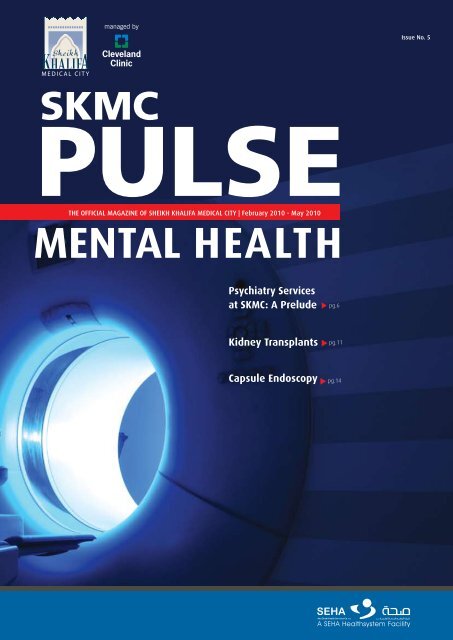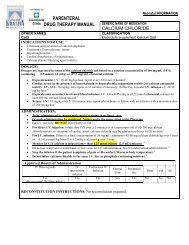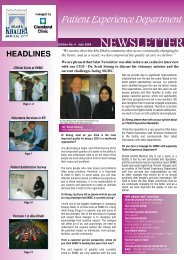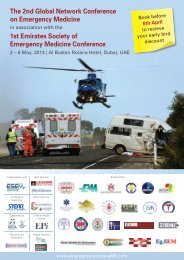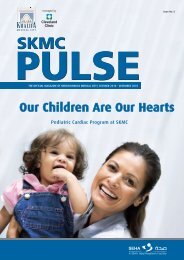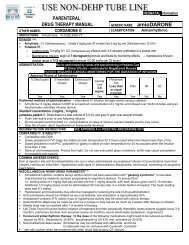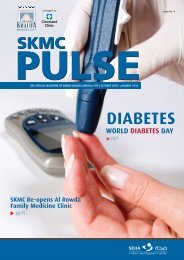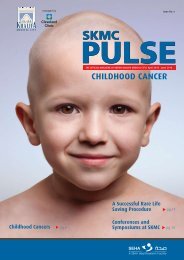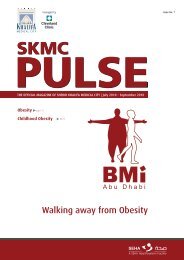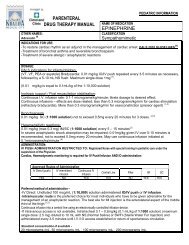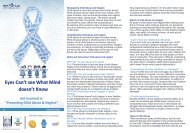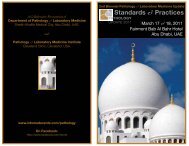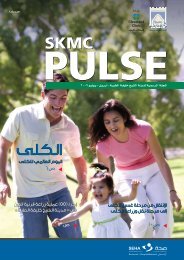MENTAL HEALTH - Sheikh Khalifa Medical City
MENTAL HEALTH - Sheikh Khalifa Medical City
MENTAL HEALTH - Sheikh Khalifa Medical City
Create successful ePaper yourself
Turn your PDF publications into a flip-book with our unique Google optimized e-Paper software.
NOTE FROM THE CEODear Reader,Three months into the new year and I can share with you my content on the progress madeso far and the prospects of the upcoming achievements for the remainder of the year. In thefirst quarter of the year, we organized more than 12 conferences and community awarenesssessions on different disciplines of medicine to increase public awareness and broaden theknowledge of our medical staff and other medical staff from different organizations onnew prospects in medicine. This active community engagement is driven by our belief thattreatment starts at home, by following a healthy lifestyle and being aware of the illnessesand seeking early detection through screening and checkups.Moreover, we continue to introduce new procedures that would broaden our offerings andhelp the residents of Abu Dhabi in getting the most up to date medical practices. In thisquarter, the capsule endoscopy services started at SKMC, which allows doctors not only tovisualize the small bowel (an area previously difficult to visualize) but also the completebowel from gullet to colon. On another front, the first successful positive cross match(PXM)-desensitization living donor kidney transplantation was performed at SKMC, whichmeant that people in need for kidney transplants have more access to potential donors byeliminating the antibodies that would reject the transplanted organ.On the business side, I spent the first 3 months communicating to SKMC staff our business planfor the year; enhanced awareness of the corporate goals increases employee engagementand commitment towards achieving our goals. We continue to align the organization tomatch the needs of the people we serve and we redefined our mission, vision and values totranscend the values that Cleveland Clinic had created, on to SKMC.Last but not least, this quarter we celebrated 10 years of SKMC, 10 years of serving our familiesand friends and working towards a healthier community. In 10 years, SKMC positioned itselfas the largest healthcare provider in Abu Dhabi city, being the most advanced healthcareorganization with quality standards that match the best of international standards. All of thisenables the premium qualified staff we have to deliver the best healthcare to our people.Best Regards,Tej Maini, MD, FACSChief Executive Officer<strong>Sheikh</strong> <strong>Khalifa</strong> <strong>Medical</strong> <strong>City</strong>4
<strong>MENTAL</strong> <strong>HEALTH</strong>Mental Health Awareness ProgramBy: Dr. Tarek DarwishConsultant PsychiatristBeing the largest medical facility dealing with all psychiatric disorders in theEmirate of Abu Dhabi, the unique role of the Behavioral Sciences Pavilion (BSP)mandates the need to take a further step in promoting health education in thecommunity, raising awareness of mental health fundamentals and correctingthe misconceptions of mental illnesses and their treatments. The BSP worksclosely with various civil, governmental, educational and service entities toeducate the community on mental health topics as well as provide a platformfor information exchange and Q & A sessions where specialists hold lecturesand seminars targeting different subjects within the field of mental health.Despite these efforts, there is still a profound deficiency in communityunderstanding of the nature of mental illness and its treatment approaches; andthis has led to hesitation and fear of seeking help when needed. Realizing thisurgency and their responsibilities towards it, the BSP Management decided toinitiate a comprehensive, community-wide Mental Health Awareness ProgramThat started in February 2010.The program includes monthly public talks on the first Tuesday of each monthin which a discussion is held about a topic of interest, and that could be eithera psychiatric illness and its treatment, or a social/psychiatric problem fromwhich some people may suffer.These monthly discussions are conducted by a psychiatrist along with a bevyof physiologists and socialists in a two-hour format divided into two parts: thefirst hour allocated for viewing the topic thoroughly, using simple and friendlyeducational tools such as documentaries, short visual scientific reports andbrief lectures; the other half of these sessions includes a discussion to answeraudience questions.The fifth health talk of the Mental Health Awareness Program will explorethe topic of ‘Depression’ and will be held on Tuesday, 6 July 2010 in the BSPauditorium at 10:30 am. The public is kindly invited to attend.6
<strong>MENTAL</strong> <strong>HEALTH</strong>Psychiatry Services at SKMC: A PreludeBy: Dr. Mufeed RaoofSpecialist PhysiatristThe Psychiatric rehabilitation unit offers services through the following: aDay Center which is a half-day accommodation geared towards patients’rehabilitation after recovering from the acute phase of mental disorder; aCommunity Case Management system where multidisciplinary teams followup patients at their homes to provide medical, psychological and educationalhelp; a Crisis Intervention Unit where a specialized team helps in resolvingpatients’ crises at home, or help in containing and bringing difficult patientsto the hospital; and a Hotline Service to answer queries, connect to crisisintervention teams, or help book an appointment.Other unique qualities of the BSP unit include: its adoption and implementationof a comprehensive approach to management whereby multidisciplinaryteam members work together to assess and treat people with mentalhealth problems; and the fact that the unit is also a teaching facility thataccommodates medical students, interns and residents, providing them withwell-established training programs. The facility also provides educationalservices in collaboration with relevant governmental organizations.In March 2010, the BSP launched a long-term mental health awarenessprogram targeting the public to educate and raise the level of awareness onmental health issues. Such a program represents the BSP’s mission to fulfillthe vision of maintaining a community that is mentally and psychologicallyhealthier.The Behavioral Sciences Pavilion (BSP) at SKMC, is a unique multiservice facilitythat provides support for people seeking psychiatry services in the United ArabEmirates in general and in the Emirate of Abu Dhabi in particular.The uniqueness of BSP lies in the following: (1) it is considered the largestmental health service provider in the UAE, with a bed capacity of 125 beds; (2)it is a one-of-its-kind facility where all possible modern mental health servicesare provided as per international standards; (3) services offered includepsychiatric services on outpatient and inpatient bases; psychological services,where a highly specialized team offers all kinds of psychological therapies;social services in collaboration with the relevant social support facilities in thecountry; (4) in addition to the general adult psychiatry unit, it encompassesspecialized units to provide mental health services to all age groups and otherspecific categories in the community; (5) it offers psychiatric consultation –liaison services to all departments in SKMC and other treatment facilities underthe care of the Abu Dhabi Health Services Company, (SEHA); (6) and it has themost advanced psychiatric rehabilitation unit in the region.7
<strong>MENTAL</strong> <strong>HEALTH</strong>Mood DisordersBy: Dr. Abdulnaser AridaSpecialist PsychiatristMood is a pervasive and sustained feeling that is experienced by a person, andit can be normal, elevated, or depressed. Healthy persons experience a widerange of moods and affective expressions. Mood disorders include a large groupof psychiatric disorders in which pathological moods and related vegetative andpsychomotor disturbances dominate the clinical picture.Mood disorders are best considered as syndromes consisting of a cluster ofsigns and symptoms sustained over a period of weeks to months representinga marked departure from a person’s habitual functioning, and tend to recuroften in periodic or cyclical fashion. These disorders always result in impairedinterpersonal, social and occupational functionality. They are divided on thebasis of polarity; so patients with only major depressive episodes are said tohave major depressive disorders, and patients with both manic and depressiveepisodes are said to have a bipolar disorder.Patients with manic episodes demonstrate elevated moods, expansiveness,flight of ideas, decreased sleep, and grandiose ideas. Patients with depressiveepisodes experience depressed moods, loss of energy and interest, feelingsof guilt, difficulty in concentrating, loss of appetite, and thoughts of deathor suicide. Other signs and symptoms of mood disorders include change inactivity levels, cognitive abilities, speech and vegetative functions (e.g. sleep,appetite, sexual activity, and other biological rhythms).For nearly 2500 years, mood disorders have been described as one of themost common diseases of mankind, but only recently have they commandedmajor public health interest. The World Health Organization has rankeddepression fourth in a list of the most urgent health problems worldwide. Thedisability induced by depression compares with and often exceeds those ofsuch diseases as hypertension, Diabetes Mellitus and chronic pain.Mood Disordersin Children‘Mood Disorder’ is a term given to the group of diagnoses where a disturbancein the person’s mood is the main underlying feature. There are major depressivedisorders and bipolar disorders with intermittent periods of manic and depressedepisodes. Criteria for mood disorders are same for children and adults, with afew exceptions. At all ages, depressed mood inferred from observation of thepatient (appears sad or tearful) can be substituted for the patient’s report.The diminished interest or pleasure in activities can be met by observed apathy.Children and adolescents often report this as pervasive boredom. Mood-relatedsymptoms may be manifested in different ways at different developmentallevels. Key indicators of depression in young people are declining schoolperformance, withdrawal from social activities, somatic symptoms (especiallyheadaches and abdominal pain), sleep difficulties, and conduct problems. Ofthe criteria for the diagnosis of mania, children have far less opportunity thanadults for buying sprees or foolish investments.Depressive disorders affect about 20 percent of women and 12 percent ofmen at some time during their lifetimes. Mood disorders are also increasinglydiagnosed in children and adolescents. Specific effective treatments are nowavailable for mood disorders including antidepressants, mood stabilizersand anti-psychotics, in addition to psychotherapy and other psychosocialinterventions.The classic pattern of alternating episodes of depressed and elated moodswith corresponding vegetative (sleep, activity, appetite) symptoms does nottypically emerge until late adolescence or adulthood. The prevalence of majordepression has been estimated at 1%-3% in prepubertal children and 3%-9%in adolescents. It should be noted that rates vary with the population, thediagnostic criteria and the methods of assessment.Many more youths have depressive symptoms then have developed into fullmajor depression. Before puberty, depression is equally common in boys andgirls, with a change in adolescence to the female predominance found inadults. Mania is rare before middle adolescence; but by late adolescence, it isnearly as common as adults.• Approximately 20% of all bipolar patients have their first episode duringadolescence.• Depression in a parent may be a powerful contributing factor to depressionin young people.• Abuse and neglect may be significant precipitants, especially in very youngchildren.8
Dementia: Key factsBy: Dr. Saad GhalibConsultant in Old Age Psychiatry, BSP<strong>MENTAL</strong> <strong>HEALTH</strong>Getting helpIf you are worried about your memory, be sure to see a physician. The doctorusually carries out a simple memory test, a physical examination and ordersblood tests. Doctors can also refer you to a specialty team with a particularexpertise in the problems of older age. The team may need to investigate aperson’s physical, social, psychological and living skills.The aim of treatment is to try and maintain a person’s quality of life in theirown environment for as long as possible. Self-help techniques such as writingnotes of things to do, keeping a diary and exercising the brain can help. Specificdrugs are also available for Alzheimer’s disease. Unfortunately, they do not curethe condition, but may delay long-term deterioration. In vascular dementia, asmall dose of aspirin may help to prevent further strokes (the value of aspirinin secondary prevention is well established) as well as medications to controlhigh blood pressure or raised cholestserol.We all tend to become more forgetful as we get older. But dementia isdifferent. It is a brain disease that often starts with memory problems, butgoes on to affect many other parts of the brain, causing difficulties in copingwith daily tasks and communication. It also causes changes in mood, judgmentor personality.It usually gets worse over time, and it is much more common in olderpeople, but can start by as early as age 40. About 1:20 over the age of 65have dementia and by the age of 80, about 1:5 will have some degree ofdementia.Alzheimer’s disease is the most common cause. Learning new informationbecomes harder – such as recent events, appointments or phone messages.Later, there may be other problems such as wandering and personal neglect. Inclinical practice, there are subtle but distinctive differences between memoryloss in normal aging and dementia.Sometimes people with dementia do not feel there is anything wrong andget angry when people try to help – they may accuse people of taking thingswhen in reality, they have lost them.Causes of Alzheimer’s disease are not known – sometimes it seems to runin families. Having said that, it is well known that Alzheimer’s and vasculardementias (due to small strokes) co-occur frequently. Furthermore, treatinghigh blood pressure, high cholesterol and diabetes can itself reduce the riskfor Alzheimer’s disease.It is worth bearing in mind that rare causes of dementia can also be reversible.Infections, dietary neglect, alcohol or brain tumors are examples of such causes.The relation between depression and dementia is not mutually exclusiveas thought previously. Depression is seen as an independent risk factor fordementia and sometimes as an early manifestation of the condition.9
<strong>MENTAL</strong> <strong>HEALTH</strong>Caffeine: Am I drinking too much?!By: Dr. Maha Al AmriBSP DirectorCaffeine has been called the most popular drug in the world. People from allover the globe drink caffeine everyday in coffee, tea, soft drinks and cocoa – itcan also be found in some painkillers and drugs.Caffeine is a central nervous system stimulant that works against adenosine,a chemical that is supposed to sooth and slow down the body. Therefore,caffeine increases alertness and makes it difficult for the body to relax. Thecaffeine stimulation effect starts after 15 minutes of its consumption. 200-300milligrams of caffeine intake is considered moderate while more than 500-600 milligrams is considered heavy caffeine intake.Some people are more receptive to caffeine stimulation compared to others.The way your body reacts to caffeine maybe determined by the amountof caffeine you are used to consume. People who are not used to drinkingcaffeinated products tend to be more sensitive to its negative impact. Otherfactors include weight, age, smoking habits and gender. Interestingly, researchsuggests that men are more prone to the caffeine stimulant effect comparedto women.A study conducted in year 2000 showed that caffeine reduced the overallsleep time, delayed the onset of sleep and also diminished the quality of sleep– these were all dose related. This study also proved that frequent caffeineconsumption can build a tolerance for caffeine, and that these frequentconsumers have sleep patterns that are less disturbed. Another study thatwas conducted in 1976 found that decaffeinated coffee does not affect thesleep pattern.There are several arguments about the safety of caffeine during pregnancy.One of the studies looked at the effect of caffeine consumption up to 300mg/day and adverse pregnancy outcome; the study followed 431 pregnantwomen and found that no relation exists between both. Another studylooked at the relationship between caffeine consumption and spontaneousabortions in over 5000 women and found that no relationship exists betweenboth too. However, the American College of Obstetricians and Gynecologistsrecommends no more than 1-2 cups of coffee per day for pregnant women.If you think that caffeine is negatively impacting your sleep pattern and youneed to cut back on caffeine, here are some tips for you:• Do it gradually, try to reduce the amount of soft drinks you consume by onecan every few days or try to drink smaller cups of coffee every few days,until you gradually reduce the amount of caffeine intake.• Go decaf. Most decaffeinated drinks taste like caffeinated ones.• Always check the label carefully. Many over the counter medicationscontain caffeine. Look for caffeine-free products.• Go for herbal teas. Herbal teas contain either a low amount of caffeine orno caffeine at all.References:• Bolton, S. Null, Gary. “Caffeine: Psychological effects, use and abuse”Orthomolecular Psychiatry 10.3.1980:202-211.• Hindmarch, I., Rigney, U., Stanley, N., Quinlan, P., Rycroft, J., Lane, J. “Anaturalist investigation of the effects of day-long consumption of tea, coffeeand water on alertness, sleep onset and sleep quality “Psychopharmacology149.2000: 203-216.• MayoClinic.com• National Sleep Foundation• MedicineNet.com10
SURGICAL PROCEDURESSurgery First of Its Kind in the Gulf RegionSKMC Surgeons Perform the First State-of-the-ArtAwake Brain SurgeryA multi-disciplinary team at SKMC recently performed the first brain surgeryfor an awake patient in the gulf region which included a tumor removal froma patient’s brain located near the brain cells responsible for vocalization andspeech. The patient was admitted to SKMC with several epileptic seizures,post-critical transient aphasia and hemiparesis. Investigations including CTscans and MRI of the brain showed a left frontal cortico-subcortical tumor,which lies in the area of the brain that is responsiblefor speech.A biopsy was then done on this lesion; and thehistopathology report showed an astrocytoma (anintermediate tumor between benign and malignant).The first line treatment for this kind of tumor is thesurgical excision or at least, partial excision of thelesion in order to reduce its volume and the masseffect on the brain.Dr. Maher Mansour, Consultant Neurosurgeon who performed this state-of-theartsurgery, stated, “The surgery for the 38-year old patient was conditioned bythe risk of post-op aphasia (inability to speak). For that reason, it was indicatedto do this procedure with the patient awake, in order to assess him while wedo electrical stimulation on the region we wanted to remove, ensuring that nocells from the normal brain were removed.” The surgery was made possibleSKMC Performs the First Positive Cross Match-desensitizationLiving Donor Kidney Transplantation in the UAEThe first successful positive cross match-desensitization (PXM) living donorkidney transplantation was performed lately at SKMC. The 50-year-old patient,Abdul Ameer (Quality Surveyor), suffered from kidney failure for the last threeyears and had been on hemodialysis since then at SKMC in Abu Dhabi, as therewas no transplant program available in the UAE at the time his kidneys failed.However, his 36-year-old wife stepped in and offered her kidney. She said,“He is my life partner and I want to spend more time with him. I didn’t thinktwice and offered him my kidney.” The patient and his wife then visited theirhome country, India, to get the kidney transplant done but when they did thematching tests, they found out that the husband had antibodies against his wifewhich meant that if his wife’s kidney had been transplanted, it would havebeen rejected right away. Thus, he was told that the operation could not bedone in India so he returned to Abu Dhabi.Months later, while he was on dialysis at SKMC, he was informed about therenal transplantation program at SKMC and that he could be a good candidatefor a kidney transplant. The required tests were done in June 2009 by amultidisciplinary team who also confirmed that he had antibodies against hiswife but informed him that his wife was still an appropriate donor. The transplantteam had instituted specific and complex procedures that could remove theantibodies from the patient’s blood so Mr. Abdul Ameer and his wife wereinformed about this good news, and the long, complex procedures to removethe antibodies were then initiated. In the meantime, the patient also sufferedfrom heart problems and underwent a coronary artery bypass at SKMC.The complex, non-surgical procedures to remove the antibodies from thepatient’s blood, took about three months to complete. Dr. Abrar Khan, Seniorbecause of the multi-disciplinary team involved, which was led by Dr. MaherMansour, who has been practicing surgery at SKMC since coming from Francein 2006; in addition to the anesthesia team and the speech therapy teamwho made an assessment of the patient’s speech through very specific testsrepeated three times for each stimulated area (gyrus) during the surgery.The post-operative images of the patient’s brain showedthat the tumor was totally removed and the brain was undernormal pressure. However, the histopathology analysis ofthe tumor showed Grade 3 astrocytoma, therefore thepatient needed complementary radiation therapy, whichhe decided to have in his home country, India.The patient tolerated this 6-hour procedure and wasdischarged from SKMC 10 days after the surgery. Staffmembers from the intensive care unit, social work,nursing, and pharmacy were also significantly involvedduring the patient’s hospital stay. “We are pleased that we were able to totallyremove the tumor from the brain and that the patient is currently doing well,speaking and moving freely with no pain”, Dr. Mansour added. “We are proudthat we expanded our capabilities under the leadership of SEHA and ClevelandClinic to perform this brain surgery for an awake patient successfully at SKMC,which is considered the first of its kind in the gulf region.”Consultant and Director, Transplantation and Hepatobiliary Surgery, stated“We arranged a series of tests for them to make sure both were fit fortransplantation and donation. The transplantation team at SKMC worked veryhard with both to make sure that their journey was as smooth as possible. Theremoval of antibodies went smoothly and the transplant went well. We weredelighted with the outcome of the surgery.”“We are proud that SKMC is now capable of performing such state-of-theartsurgery. The techniques used in preparing the patient and his wife forsurgery are cutting edge in the field of organ transplantation. Additionally, thewife’s kidney was removed using the latest laparoscopic techniques.” Dr. Khanfurther added, “The patient is very happy with his new kidney and is totallyfunctional at this time.”Currently, after the transplant was done and Mr. Abdul Ameer went home,he visits the renal transplantation clinic regularly for his monthly follow-ups.He said, “We are very pleased with the service we were offered and theprofessionalism and dedication of the transplant team at SKMC. I would liketo thank first the Rulers of the UAE for their leadership and generosity and thegovernment of the UAE for the latest developments that we are all witnessingespecially in the healthcare sector in Abu Dhabi. I would also like to thank themanagement of Abu Dhabi Health Services Company (SEHA) and SKMC whomade medical services more accessible to all the residents in Abu Dhabi.”Mr. Abdul Ameer further stated, “Thanks to the whole transplant team fortaking care of me and my wife and providing us with the emotional andpsychological support we needed throughout our journey from dialysis totransplantation.”11
BUSINESS PERFORMANCENursing as aStrategic ResourceBy: Rick Ray, Administrator; Tarey Ray, Chief Nursing OfficerGrowing poverty and inequity in a globalized world, risks posed by ecological,demographic, and socioeconomic changes, the haphazard application andimpact of healthcare reform, and the unequal distribution, composition andcompetencies of the health workforce imply focused action in favor of primaryhealthcare. In this context, nursing offers an ideal platform from which toscale up interventions to help mitigate downward trends and assist in meetingnational health targets.While suggesting the ability of nursing to provide solutions to a varietyof problems, in its 2002–2008 focus on issues confounding global healthimprovement, WHO expressed alarm regarding reports of nursing shortages,inadequate working conditions, and the poor distribution and inappropriateutilization of nursing personnel. It was noted that healthcare delivery ishighly labor-intensive, with nurses playing an increasingly critical – but oftenoverlooked – role and concluded that failure to strengthen nursing couldseriously impair the quality of healthcare, access to services, the ability ofother health practitioners to perform critical roles, and the achievement ofnational and global health goals.A “long-standing” shortage of registered nurses in the U.S. is “expected toworsen” over the next seven years. According to the U.S. Bureau of LaborStatistics, about 233,000 additional jobs for registered nurses will open eachyear through 2016, in addition to about 2.5 million existing positions. However,only about 200,000 candidates passed the Registered Nurse licensing examlast year, and thousands of nurses leave the profession each year.Several factors contribute to the shortage, including a lack of qualified instructors,decreased funding for training programs and difficult working conditions. Inaddition, some nursing positions - such as those in emergency departmentsor intensive care units - require experience and expertise, preventing hospitalsfrom hiring “newly minted” nurses for the positions.In December 2009, workforce analysts with the Bureau of Labor Statistics(BLS) projected that more than 581,500 new RN positions will be createdthrough 2018, which would increase the size of the RN workforce by 22%.Employment of RNs is expected to grow much faster than the average whencompared to all other professions.Though AACN reported a 3.6% enrollment increase in entry-level Baccalaureateprograms in nursing in 2000, this increase is not sufficient to meet the projecteddemand for nurses. HRSA officials state that “to meet the projected growthin demand for RN services, the U.S. must graduate approximately 90 percentmore nurses from US nursing programs.”According to AACN’s report on 2009-2010 Enrollment and Graduations inBaccalaureate and Graduate Programs in Nursing, U.S. nursing schools turnedaway 54,991 qualified applicants from Baccalaureate and graduate nursingprograms in 2009 due to insufficient number of faculty, clinical sites, classroomspace, clinical preceptors, and budget constraints. Almost two-thirds of thenursing schools responding to the survey pointed to faculty shortages as areason for not accepting all qualified applicants into their programs.According to the latest National Sample Survey of Registered Nurses, the totalRN population has increased at every 4-year interval in which the survey hasbeen taken since 1980. Although the total RN population increased from2,909,357 to 3,063,163 in 2008, this increase (5.3%) was comparatively lowconsidering growth between earlier report intervals (i.e. the RN populationgrew 14.2% between 1992 and 1996). In 2008, an estimated 84.8% of RNswere employed in nursing.With the average age of RNs projected to 44.5 years by 2012, nurses in their50s are expected to become the largest segment of the nursing workforce,accounting for almost one quarter of the RN population. According to the July2001 report, “Nursing Workforce: Emerging Nurse Shortages Due to MultipleFactors (GAO-01-944)”, a serious shortage of nurses is expected in the futureas demographic pressures influence both supply and demand. The futuredemand for nurses is expected to increase dramatically as the baby boomersreach their 60s and older.In the March-April 2005 issue of Nursing Economics, Dr. Peter Buerhaus andcolleagues found that more than 75% of RNs believe the nursing shortagepresents a major problem for the quality of their work life, the quality ofpatient care, and the amount of time nurses can spend with patients. Lookingforward, almost all surveyed nurses see the shortage in the future as a catalystfor increasing stress on nurses (98%), lowering patient care quality (93%) andcausing nurses to leave the profession (93%).While the anecdotes provided above are related specifically to the US, thetrends and problems are similar across a global perspective. As is evident, theshortfalls in labor, education, and image jeopardize the ability of nursing tomaintain the core services that are critical to the nursing role:• Caring for, supporting and comforting patients;• Continually assessing and monitoring health needs and responses tointerventions;• Advocacy and education of patients, families and communities;• Identifying care gaps and developing appropriate responses; and• Delivering and coordinating health services across the spectrum.Policy-makers must take heed and acknowledge the urgency, since nursingprovides a key component among global health systems and communities inproviding basic knowledge and skills necessary to the vision of better healthoutcomes for all.Nursing at SKMCNursing leadership is aware of the challenges that face the nursing profession,and they do their best to improve the status of nurses at SKMC. Severalprograms at SKMC run to increase retention of current staff and attractprospective candidates. At SKMC, reward and recognition programs include:• Nursing Award Celebration in November recognized units that showedinnovative practices and nurses selected by peers as outstandingperformers• Quarterly Team Building Days conducted by nurse managers• Monthly rounding with purpose by the manager employees on the unit,focusing on the employee needs• Monthly staff meetings with defined agendas on all units• Introduction of the clinical ladder program with 168 staff nurses achievingadvanced nursing recognition as Level III, IV and V• Nurse Leadership rounding “after hours” and weekly rounds on unitsduring day shift• Continuous journey toward Magnet designation• Unit based shared governance councils giving employees input intodecision making processes• Blocked time each week by each Nursing senior management staff soemployees can come and talk to them about any concerns12
Welcome to SKMCNewly Appointed ConsultantsNEW CONSULTANTSDr. Tarek FiadConsultant, EndocrinologyDr. Tarek Fiad, a British national, obtained his medicaldegree from Al Fateh University, Tripoli in 1983. In1989, he became a member of RCP London. He wasgranted an MD from University College Dublin in1998. In 1999, he became a Fellow of the RoyalCollege of Physicians & Surgeons of Ireland and in2002, FRCP London. Prior to joining SKMC, Dr. Fiadworked for 13 years as a consultant in diabetes and endocrinology and Head of<strong>Medical</strong> Services in the Dudley group of Hospitals, NHS foundation trust, UK.Dr. Christian Manuel Dalle-FesteConsultant, RadiologyDr. Christian Manuel Dalle-Feste, a Germannational, obtained his medical degree in 1991 fromDuesseldorf University, Germany. He specialized inRadiology in 2000 and in Neuro-Radiology in 2005from Hannover University. Prior to joining SKMC,Dr. Dalle-Feste worked for 4 years as a specialistin diagnostic radiology at the Hospital for NervousDiseases, Austria.Dr. Nada Chamel MacaronConsultant, Laboratory MedicineDr. Nada Macaron, an American national, receivedher medical degree from the American Universityof Beirut, Lebanon in 1999. She obtained herAmerican Boards in Anatomical Pathology andDermatopathology in 2004. Prior to joining SKMCin January 2010, she was an Assistant Professorat the New York University <strong>Medical</strong> Center and worked as a ConsultantHistopathologist at Histopathology and Specialty Laboratory, part of the MedsolGroup of Laboratories in Dubai, United Arab Emirates.Dr. Raza RashidConsultant, Family MedicineDr. Raza Rashid, a British national, graduated in1985 from University College London and wasaccepted in the vocational training scheme forgeneral practice. He completed the MRCGP in 1990and spent the past 12 years engaged in activegeneral practice in London. Prior to joining SKMC,he worked as the Practice Lead for the Quality andOutcomes Framework in the Epping Forest PrimaryCare Trust, UK.Dr. Saad Faheem GhalibConsultant, Old Age PsychiatryDr. Saad Ghalib, a British citizen, received his MBChBfrom Baghdad University in 1992. He joined theRoyal London Hospital training scheme in psychiatryin 1998 and became a member of the Royal Collegeof Psychiatrists (MRCPsych/UK) in 2001. Dr. Ghalibjoined the University of London for higher specialisttraining with honorary research responsibilitiesin 2002 and he was awarded a CCST in Old AgePsychiatry in 2005. Prior to joining SKMC in January 2010, Dr. Ghalib workedat the South Essex NHS University Foundation Trust (UK) as a SubstantiveConsultant in Old Age Psychiatry since 2006.SKMC Holds a Series of Public Health TalksAs part of its ongoing commitment in promoting health education and raisingthe public awareness on disease prevention, SKMC organizes a series ofmonthly public health talks. In January and in cooperation with Cleveland Clinic,the Cardiac Sciences Institute hosted two world–renowned guest speakers fromthe Cleveland Clinic – Dr. Walid Saliba and Dr. Wael Jaber, Cardiologists – topresent a two-hour health talk about heart diseases. The health talk includedtwo presentations under the title of “How to Prevent Heart Disease” and“Palpitations: Causes and Therapy” followed by a question and answer session.Moreover, the Bariatric & Metabolic Institute – Abu Dhabi of SKMC also holds amonthly public health talk about obesity. The lectures that were scheduled inFebruary, March, April and May under the title of “Walking Away from Obesity”attracted more than 70 attendees each.The lectures cover all essential topics in fighting obesity and promoting ahealthy lifestyle. Attending one of the lectures on obesity is an opportunity forthose who may be considered to be morbidly obese to find out about some ofthe medical and surgical treatment options. In addition, the physicians wouldexplain to the audience the potential complications of bariatric surgery.The next public health talk on obesity is scheduled on 15 June 2010. It is worthyto mention that since bariatric surgery was introduced at SKMC in June 2009,45 bariatric procedures were successfully performed for patients who had anextended history of obesity and obesity-related diseases such as diabetes andhypertension, and had a Body Mass Index (BMI) of more than 40 kg/m2.Such public health talks organized by SKMC take place at the SKMC auditoriumlocated at the first floor of the Surgical Pavilion. Invitations are extended to thepublic and all of SKMC’s patients. The events are advertised and announcedwithin SKMC facilities and in conjunction with the local media and corporatecompanies in Abu Dhabi. Usually, no pre-registration is required to attendthese health talks.13
QUARTERLY NEWSSKMC Offers CompleteCapsule EndoscopyServices for itsPatients<strong>Sheikh</strong> <strong>Khalifa</strong> <strong>Medical</strong> <strong>City</strong> (SKMC) managed by Cleveland Clinic announced inFebruary 2010 the launch of a new service for its patients within its InterventionalEndoscopy Program of the Gastroenterology Division. The newly offered serviceis the Capsule Endoscopy, an examination of the digestive tract by using a selfcontainedwireless imaging device capable of transmitting images of the tractto an external receiver. This allows doctors not only to visualize the small bowel(an area previously difficult to visualize) but also the complete bowel fromgullet to colon. Moreover, such a procedure comes as a real relief to patientswho are not candidates for conventional endoscopy with a camera inserted viaa flexible tube, or who find such procedures uncomfortable.The Capsule Endoscopy technique has been started at SKMC under thesupervision of Dr. Nigel Umar Beejay, Lead Consultant in Capsule Endoscopy,who was involved in using the first public demonstration of the capsule inthe world in 2001 in Canada and who teaches and lectures internationally oncapsule endoscopy.Three types of capsules areavailable at SKMC to examinethe esophagus, to examinethe small bowel, and toexamine the colon.Commenting on this newservice, Dr. Tej Maini CEO ofSKMC said, “We are proudto introduce these newtechniques to our patients. Itillustrates our commitmentto deliver state-of-theartmedical practices. Lessinvasive approaches such ascapsule endoscopy have wellpositioned us as an institution that allows its physicians to advance the standardof care for their patients. Physicians hired at SKMC are of a very qualified caliberand are always supported to offer the best care possible to our patients.”“We are proud to see the partnership between SEHA and Cleveland Clinictranslating into the introduction of new cutting edge diagnostic tools like thisat SKMC. This means that patients do not have to leave country to find thistype of service, and that Abu Dhabi is now home to a high level of expertisein this discipline. I think this is yet another example of SEHA’s, ClevelandClinic and SKMC’s ongoing commitment to ensuring our competitiveness withthe best systems in the world in terms of diagnostic services and outcomesmanagement, ” said Clyde Eder, Chief Operating Officer for SEHA.SKMC & Cleveland Clinic Participation inthe Arab Health Congress 2010<strong>Sheikh</strong> <strong>Khalifa</strong> <strong>Medical</strong> <strong>City</strong> (SKMC) and the Cleveland Clinic, Ohio participatedin the Arab Health Congress of which SEHA was the leading sponsor for, from25–28 January 2010. More than 30 physicians from SKMC and the ClevelandClinic presented lectures in the Cardiovascular Diseases, Anesthesia, Surgery, andQuality conferences during the congress. SKMC also chaired the CardiovascularDisease and the Quality Management in Healthcare conferences.The Cleveland Clinic Center for Continuing Education and the Institute forInternational Research (IIR) Middle East recently partnered to significantlyexpand quality continuing education activities in the Middle East.“The collaboration between the Cleveland Clinic Center for Continuing Educationand IIR Middle East allows us to broaden quality continued medical educationactivities benefiting the local community as well as the region beyond,” saidWilliam Carey, M.D., Director for the Cleveland Clinic Center for ContinuingEducation.Commenting on that, Dr. Tej Maini CEO of SKMC stated, “We are proud totake part of such an important medical meeting as the Arab Health Congress2010. We are aware that more than 5,500 healthcare professionals worldwideattended these conferences; and the participation of our physicians as speakersand as attendees every year illustrates SKMC’s commitment to state-of-the-arttreatment and promotion of Continuous <strong>Medical</strong> Education (CME).”As the Chair of the Quality Management in Healthcare and the CardiovascularDisease conferences of the Arab Health Congress, Dr. Samer Ellahham – ChiefQuality Officer of SKMC said, “The conferences during the Arab Health Congresswere all sponsored for the first time by the Cleveland Clinic Foundation forContinuous <strong>Medical</strong> Education. Speaking about the Cardiovascular Diseaseand Quality conferences, I could say that they included state-of-the-artpresentations by international experts in both fields, highlighting the mostrecent advances in clinical and academic settings.”SKMC was also highly commended at the Arab Health Awards 2010 under twocategories: Excellence in Surgery Services and Excellence in Hospital EmergencyDepartment. On the exhibition side, SKMC participated and exhibited in SEHA’sbooth along with all of SEHA’s facilities in a contemporary designed booth.14
Different ConferencesOrganized by SKMCDuring the first quarter of 2010, SKMC organized more than five conferencesand symposiums related to different medical specialties. To start with, SKMC’sFamily Medicine Clinics organized a symposium on geriatric care in February.Attended by more than 40 family medicine physicians and primary healthcareproviders, the speakers at the symposium discussed the diagnosis andmanagement of dementia, diabetes in the elderly, geriatric assessment in theprimary care, and acute and chronic coronary syndrome in elderly. The goal ofthe symposium was to increase the medical and public awareness of the rightof the elder population to grow with dignity as well as having access to goodmedical and social care, especially that 20% of the patients at SKMC’s FamilyMedicine Clinics are above 65 years old.In March, SKMC also organized the first Abu Dhabi Cardiac and Vascular DiseaseConference in cooperation with Zayed Military Hospital at the Beach Rotana Hotelin Abu Dhabi under the Patronage of H.E. <strong>Sheikh</strong> Nahyan Bin Mubarak Al Nahyan,Minister of Higher Education and Scientific Research. On behalf of H.E. <strong>Sheikh</strong>Nahyan Bin Mubarak Al Nahyan, the two-day conference was inaugurated byH.E. Dr. Abdulla Al Khanbashi, Vice Chancellor of UAE University in the presenceof Carl Stanifer, CEO of SEHA; Dr. Ali Al Obaidli, Chief Clinical Officer of SEHA; Dr. TejMaini, CEO of SKMC and members of SEHA and SKMC’s top management.The conference was attended by more than 200 internists, general practitioners,cardiologists, neurologists and pharmacists and included seven differentsessions covering all essential topics in the field of cardiac and vasculardiseases. Discussions during the first day included the status of cardiac diseasein Asia and the Middle East, the management of cardiovascular co-morbidities(diabetes, dyslipidemia, hypertension), prevention of cardiovascular diseaseincluding impact of smoking cessation and the importance of patient andpublic education. The second day focused on peripheral vascular disease,QUARTERLY NEWSincluding an introduction to the epidemic of vascular disease which is a vastlyunder diagnosed in this region. The topics were pertinent to the patientsseen by the internists, general practitioners, cardiologists and neurologists inthe community. Some of these topics included strokes and the role of safecarotid stenting, and the treatment of diabetic feet – a common problem inthe Middle East.Updates on Deep Venous Thrombosis (DVT’s), venous problems, renal diseaseas well as the evaluation of the quality of the region’s cardiovascular caredelivery were also discussed. The talks were given by national and internationalspeakers from the World Health Organization (WHO) and from hospitals inQatar, Kuwait, India, Sweden and USA.Another conference was launched by the nursing department at SKMC, callingfor a team-based approach to preventative wound care and combating diabeticfoot complications. More than 400 healthcare professionals from all over theMiddle East attended the 2nd Abu Dhabi Wound Care Conference.Commenting on the conference, Dr. Atul Mehta, Chief <strong>Medical</strong> Officer at SKMCstated, “SKMC supports research into all aspects of Wound Managementand the prevention of Limb Loss in the Diabetic population with a focus onproviding the latest minimally invasive (endovascular) techniques for thispurpose. Our Wound Care and Endocrinology teams have introduced diabeticfoot prevention program where every patient with diabetes will be screenedfor risk of foot problems.”"Abu Dhabi Continence Week" and "Pathology & Laboratory MedicineUpdate Conference" Attract Healthcare Professionals from the RegionThe Surgery Institute at SKMC organized the Abu Dhabi Continence Week from22 - 28 March 2010 at the Sheraton Hotel, Abu Dhabi. The week consistedof six different events related to urinary incontinence that were attended by300 general practitioners, urologists, pediatric urologists and surgeons, nursesand physiotherapists. Last year, SKMC organized the 1st UAE InternationalMeeting on Diagnosis and Treatment of the Neurogenic Bladder in Childrenand Adolescents, and the 1st UAE ICCS Course on Continence in Childrenand Adolescents. The successful outcome of both courses stimulated theorganization of the Abu Dhabi Continence Week 2010.Under the patronage of SEHA and with the cooperation of the Emirates <strong>Medical</strong>Association, the conferences’ organizers hosted the Bristol Urological Institute,the World Federation of Neurorehabilitation and PromoCon, and an excellentfaculty of experts from the UAE, the Middle East and Europe.The workshops and courses included the first Reunion of the Spina Bifidaand Hydrocephalus Panel for the Gulf Area (WFNR), the first UAE Workshopon Spinal Cord Injuries, and for the first time in the UAE, the Bristol UrologicInstitute brought in the famous Certificate Course in Urodynamic. During theweek, SKMC also organized the second UAE International Meeting on Diagnosisand Treatment of the Neurogenic Bladder, the second UAE Workshop onManagement of Cerebral Palsy (WFNR) and the first UAE Workshop on Bowel/Bladder Management for Nurses and Families.On the other hand, the Laboratory Medicine Department at SKMC organized ajoint conference on Pathology and Laboratory Medicine at the Hilton Hotel AbuDhabi on 20 March 2010 in cooperation with the United Kingdom AccreditationService (UKAS)/Clinical Pathology Accreditation (CPA) and the Royal College ofPathologists in UK. A distinguished faculty of experts from SKMC and the RoyalCollege of Pathologists – UK, presented the latest views on various aspectsof Laboratory Accreditation, Clinical Chemistry, Microbiology, Hematology andAnatomic Pathology. The conference hosted up to 200 laboratory medicineprofessionals and clinicians with an interest in hematology, chemistry,microbiology or dermatology. The speakers covered various topics and updatesin the field of laboratory medicine including quality, accreditation as well asseveral new developments within the field of hematology, microbiology, clinicalchemistry, anatomic pathology, diabetes, bladder carcinoma and vitamin D.Dr. Laila Abdel-Wareth said: “This conference was a real opportunity fornetworking with colleagues from the laboratory medicine field to shareexperiences, craft solutions and form lasting relationships with internationalmedical centers and organizations. It’s worth mentioning that SKMCemploys approximately 180 practitioners of clinical laboratory science in thePathology and Laboratory Medicine department, who play an increasinglyvital role in the diagnosis and prevention of diseases. In 2009, more than 2million laboratory tests were performed for our in-patients and outpatientsat SKMC’s specialty clinics.”15
IN SHORTSKMC Hosts“Live Music in Hospitals: A Healing Experience”Concert Lecture for its PatientsFor the second year, SKMC hosted the Music and Medicine Concert Lectureon March 29 in cooperation with the Cleveland Clinic Arts and MedicineInstitute and the Abu Dhabi Music and Arts Foundation (ADMAF). Morethan 70 patients, visitors and doctors enjoyed the event, which tookplace at SKMC’s main foyer. The goal of hosting the Music and MedicineConcert at SKMC is to bring arts and music to the bedside, which assistsin the healing process. Dr. Tej Maini, CEO of SKMC stated that, “We arepleased to host this program and bring the arts to SKMC’s patients andvisitors. Studies have shown that music has positively impacted healthand wellness throughout time and across cultures.“Our patient population at SKMC is multicultural – we receive patients frommore than 60 different nationalities”, Dr. Maini added.SKMC Marks the World Kidney Day on 12March 2010 at Al Corniche Beach in Abu DhabiGlobally, more than 500 million individuals, or about one adult in ten,have some form of chronic kidney disease. The 2010 campaign inMarch highlighted the importance of diabetes prevention as diabetes isconsidered one of the key causes of chronic kidney disease. To mark the4th annual “World Kidney Day” celebrated at SKMC, the Renal Programteam organized several activities and check-up stations at the hospital aswell as daily symposiums targeted to the physicians and nurses from 7 – 11March 2010. Moreover, check-up stations were also set-up at Al CornicheBeach in Abu Dhabi for the public. Dr. Abdul Karim Saleh, Chairman ofthe Renal Program at SKMC, stated “Screening must be a high priority forpeople considered to be at risk of kidney disease. The early detection ofkidney impairment is essential and allows suitable treatment before kidneydamage or deterioration manifests itself through other complications.”Awareness Raised on Colorectal Cancer on24 & 25 MarchThe Oncology department at SKMC organized a two-day awareness programon colorectal cancer targeting at the visitors and patients of SKMC as well ashealthcare professionals at SKMC. Colon cancer is one of the most curabletypes of cancer if it is diagnosed early. When detected at its earliest stages,chances for a cure are as high as 90 percent. Dr. Atul Mehta, Chief <strong>Medical</strong>Officer of SKMC stated, “There are a variety of simple steps that could betaken to help prevent colorectal cancer. Learning about the risk factors,knowing the signs and symptoms, and having regular screenings for coloncancer are the best defenses against this all-too-common cancer.”The majority of SKMC staff showed up at SKMC wearing blue during the“Wear it Blue” day to raise awareness on colorectal cancer. It was aneffective way of getting people to talk about this important issue andsave lives in the process. Pamphlets and educational leaflets were alsodistributed. Scientific lectures on colon cancer were presented to more than90 healthcare professionals from SKMC.SKMC Organizes “Sun, Diet and Your Skin”Day on 22 JanuarySKMC launched a Skin Health Awareness Campaign in January to help raisepublic awareness about the importance of the skin and its wellbeing at AlCorniche public beach. During the event, short consultations and question/answer sessions with the dermatology team and a dietician were offeredto visitors. The team also offered individual calculations of skin types and apreventative skin examination including dermal surface microscopy.SKMC and General Women’s Union Organizesa Public Symposium about Women’s HealthSKMC organized the first public symposium about women’s health on 6 April2010 at the General Women’s Union auditorium, targeting all women in thecommunity. During the health talk, different topics related to women’s healthwere discussed including mental health, pregnancy, vaccinations, menopause,cervical cancer (early diagnosis and vaccination), breastfeeding benefits andchallenges, and children’s vaccinations. After the talks, the door was open forthe attendees’ questions and discussions in order to give a chance to betterunderstand and correct any miscomprehension or confusion. The success ofthe symposium, attended by more than 300 women, was evident.SKMC Celebrates the InternationalChildhood Cancer Day on 18 February 2010Numerous activities for children and families were organized by SKMCduring the International Childhood Cancer Day to support and raise theawareness on pediatric oncology. Activities took place at the SKMC premisesfor the oncology patients and at Al Khalildiyah Mall for the public. Studieshave shown that childhood cancer is highly treatable with early diagnosisand access to the best treatment. About 75-80% of patients survive theirdiseases. However, late diagnosis reduces the chances of recovery, andwith no specialized treatment, the child’s survival would be in danger.16
SKMC DATASKMC DataThe statistics below reflect a general summary of the activities at SKMC from 1January 2010 - 31 March 2010.TypeNumberOutpatient Specialty Clinic visits (14 Clinics) 43,439SKMC Physical Medicine & Rehabilitation andCardiac Rehabilitation Outpatient visits 7,822Occupational Health visits 3,914Inpatient admissions (<strong>Medical</strong> and Surgical Pavilions only) 4,239Short and day-stay visits 1,728Emergency Department (ED) visits (Triaged-in only) 18,593Khalidiyah Urgent Care Center (UCC), Madina andEttihad Walk-in Clinics visits (Triaged-in only) 20,475Family Medicine Clinics visits 59,768Dental Centers visits (2 centers) 17,749Home Care Program visits 2,302Adults Cardiac surgeries 58Pediatrics Cardiac surgeries 83Adults & Pediatrics surgeries (minor and major) 1,899Day care surgeries 342Hemodialysis and Peritoneal Dialysis runs (adults and pediatrics) 10,045Behavioral Sciences Pavilion (BSP) Outpatient Clinic visits 5,198Behavioral Sciences Pavilion (BSP) inpatient admissions 240Pharmacy medication prescriptions 616,703Radiology tests for inpatients and outpatients 29,433SKMC manages a total of 781 beds in four different facilities including theSurgical Pavilion, <strong>Medical</strong> Pavilion, Behavioral Sciences Pavilion and the AbuDhabi Rehabilitation Center. Our latest bed statistics are as follows:TypeBeds in Operation<strong>Medical</strong> Pavilion 347Surgical Pavilion 221Behavioral Sciences Pavilion (BSP) 125Abu Dhabi Rehabilitation Center (ADRC) 88TOTAL 781


